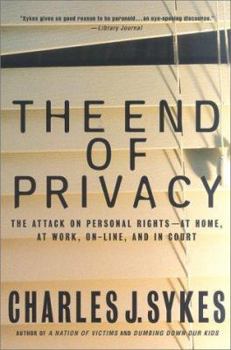The End of Privacy: The Attack on Personal Rights at Home, at Work, On-Line, and in Court
Select Format
Select Condition 
Book Overview
As Justice Louis Brandeis suggested more than a century ago, privacy--the right to be left alone--is the most valued, if not the most celebrated, right enjoyed by Americans. But in the face of computer, video, and audio technology, aggressive and sophisticated marketing databases, state and federal "wars" against crime and terrorism, new laws governing personal behavior, and an increasingly intrusive media, all of us find our personal space and freedom under attack. In "The End of Privacy," Charles Sykes traces the roots of privacy in our nation's founding and Constitution, and reveals its inexorable erosion in our time. From our homes and offices to the presidency, Sykes defines what we have lost, citing example after example of citizens who have had their conversations monitored, movements surveilled, medical and financial records accessed, sexual preferences revealed, homes invaded, possessions confiscated, and even lives threatened--all in the name of some alleged higher social or governmental good. Sykes concludes by suggesting steps by which we might begin to recover the territory we've lost: our fundamental right to our own lives.
Format:Paperback
Language:English
ISBN:031226318X
ISBN13:9780312263188
Release Date:October 2000
Publisher:St. Martin's Griffin
Length:288 Pages
Weight:0.88 lbs.
Dimensions:0.7" x 6.1" x 9.2"
Customer Reviews
1 rating
Another hit!
Published by Thriftbooks.com User , 25 years ago
I discovered Sykes when I read "Nation of Victims" several years ago. Interestingly, another book by a different author with the same name "The End of Privacy" was released about the same time as Sykes' "End of Privacy" by Reg Whitaker.Sykes is more in line with my own concerns regarding privacy as well as the even more compelling issue which is the threat to freedom posed by intrusive tracking technologies.The ultimate horror will occur when this technology, matures and riding on a universal netted infrastructure eventually replaces paper currencies, which are still nominally anonymous, with a digital system which is not.That will bring the real end of privacy and freedom. Because it will eliminate most criminal activity for profit and a host of other problems as well it will almost certainly be accepted by the majority of Americans as progress.The very best portrayal-in fact the only portrayal of this kind of system is in "Transfer-the end of the beginning" by Jerry Furland. I recommend all Sykes fans, especially those interested in near future outcomes and consequences, to get a copy of "Transfer".





